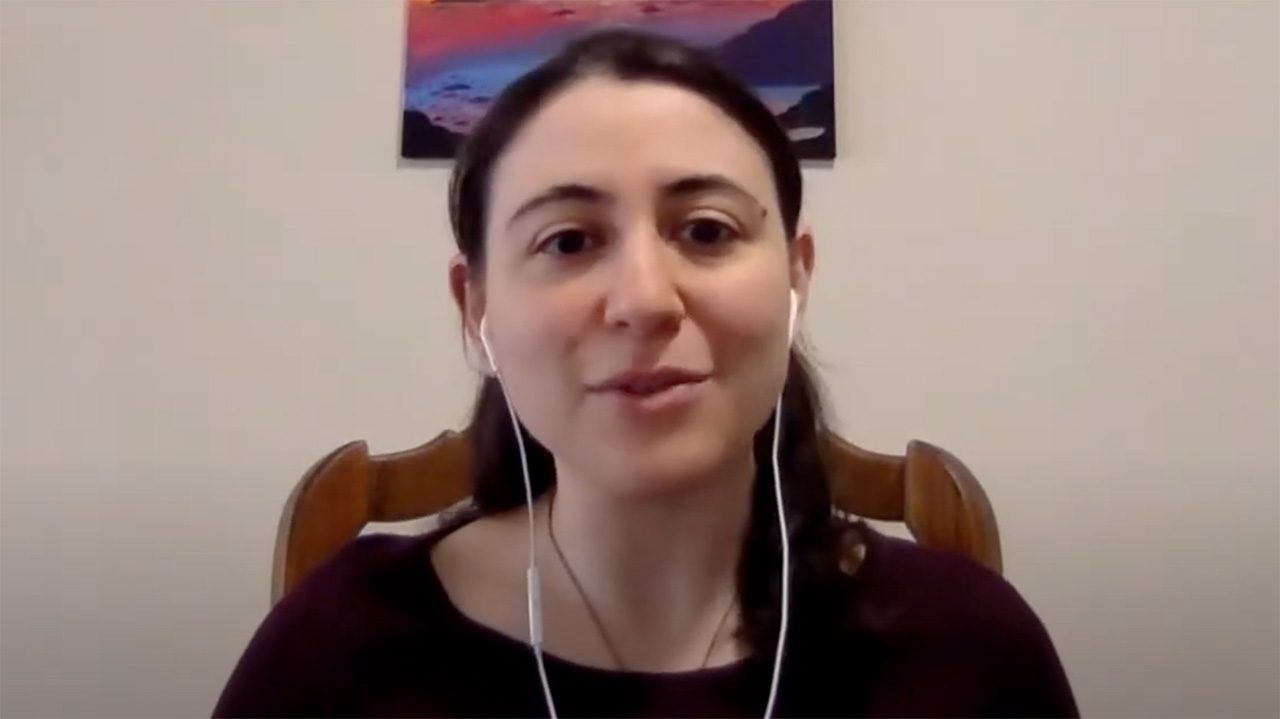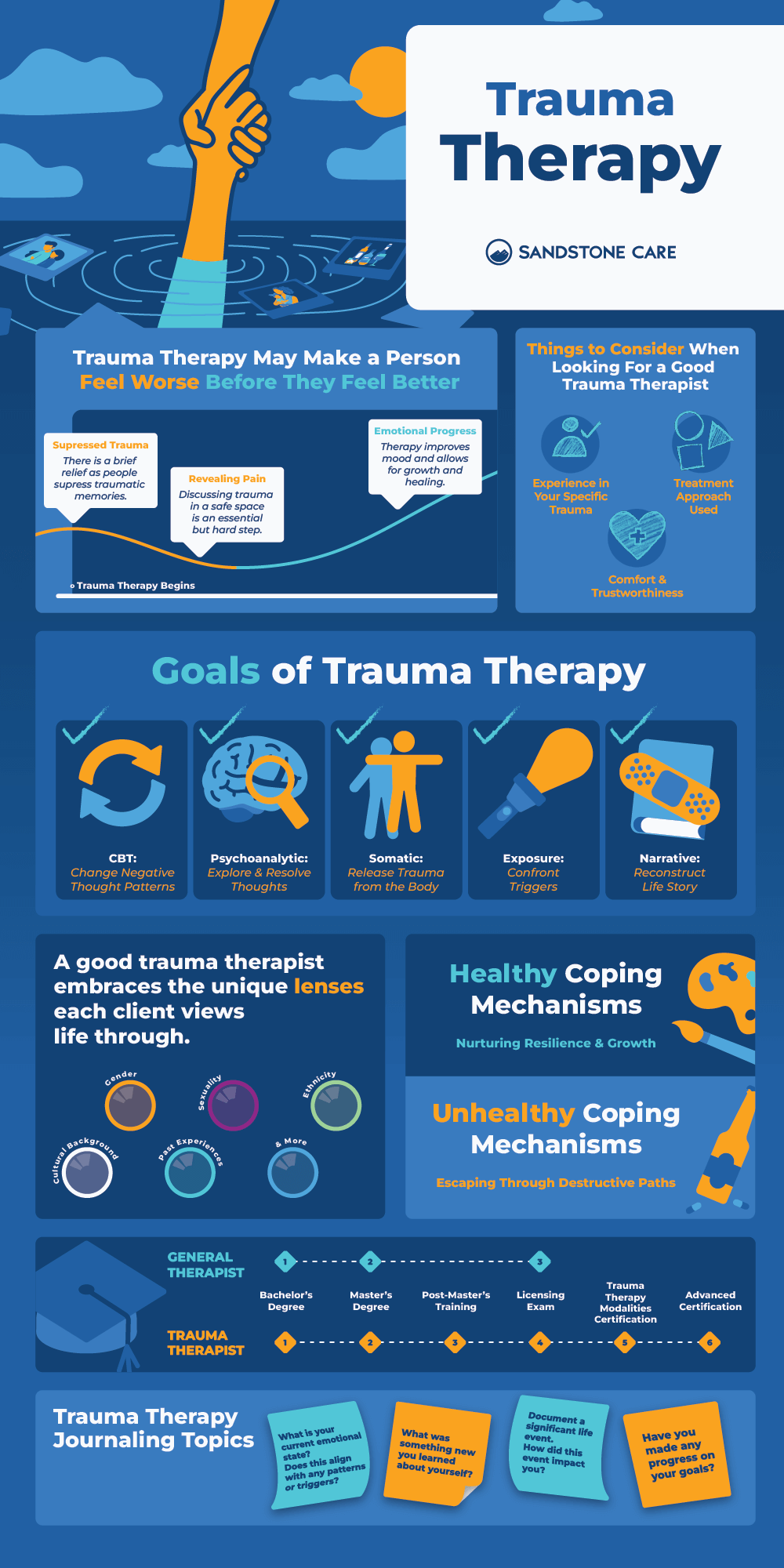Trauma-Informed Therapy
What Is Trauma Therapy?
Trauma therapy is a type of talk therapy that focuses on traumatic experiences and how they impact a person emotionally and mentally.
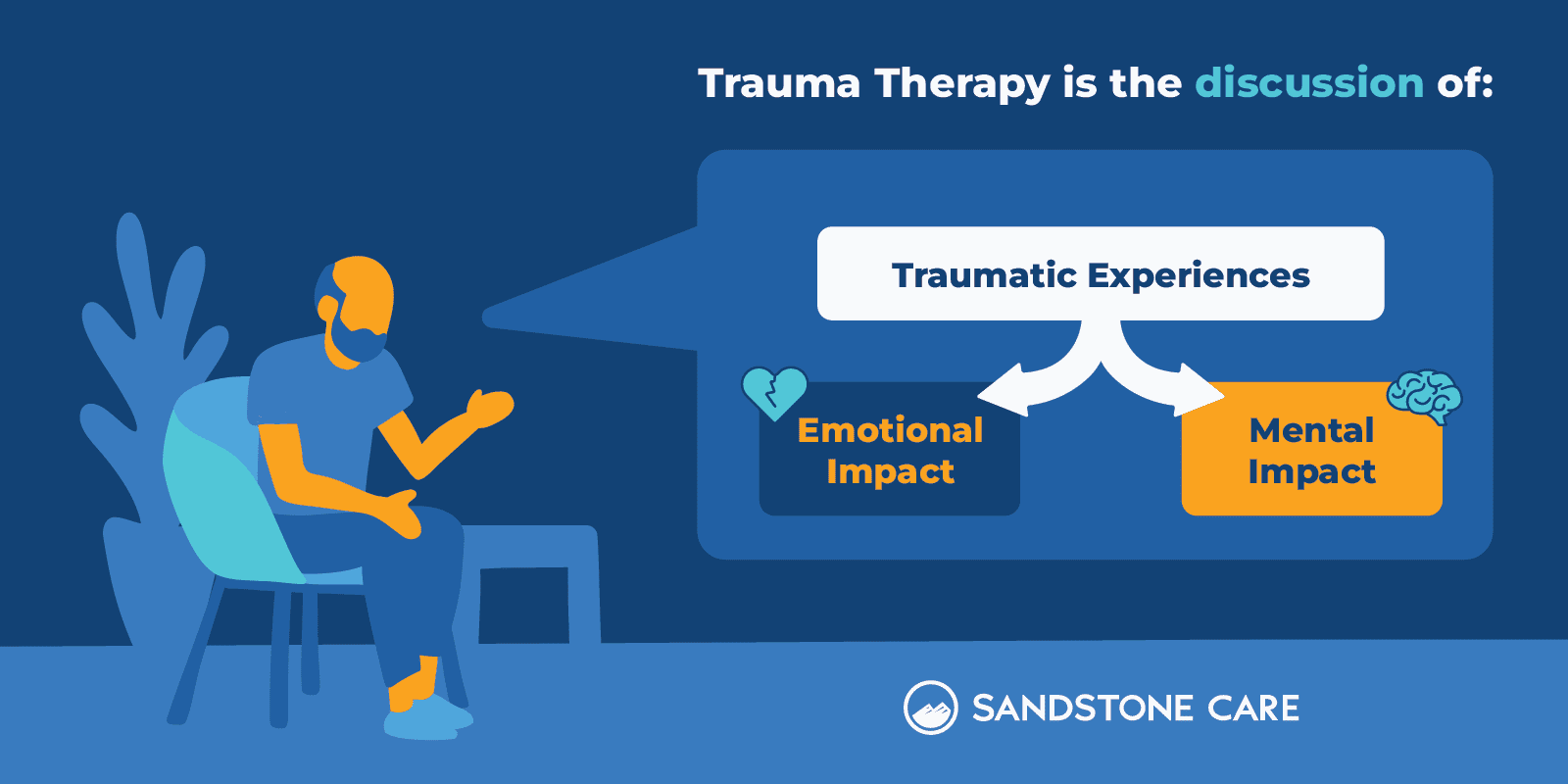
Trauma therapy can help a person process their trauma, manage the symptoms of post-traumatic stress disorder, and learn new coping mechanisms.
What Is Trauma-Focused Therapy?
Trauma-focused therapy is a form of psychotherapy that involves different therapy techniques to help a person process their trauma.
What Are the 5 Principles of Trauma-Informed Care?
The 5 principles of trauma-informed care are safety, trustworthiness, choice, collaboration, and empowerment.
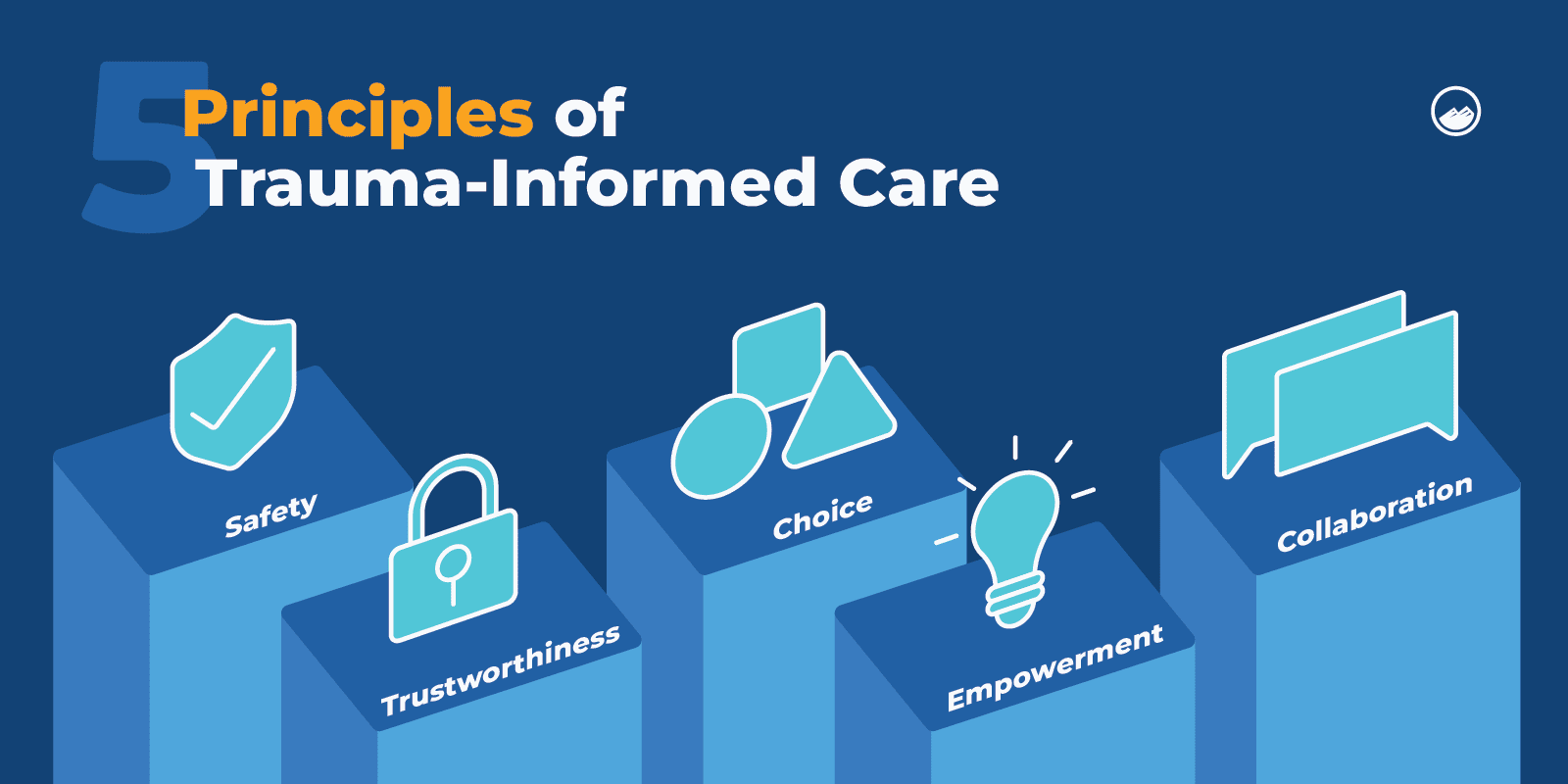
What Are the Goals of Trauma Therapy?
Everyone’s goals for therapy are different.
But, one of the main common goals of trauma therapy is to help individuals process their trauma and begin to heal from their traumatic experiences.
How Is Trauma Therapy Done?
In trauma therapy, the therapist may use different techniques depending on the unique needs and goals of the individual.
It starts by establishing safety and trust. Over time, the therapist and individual work together by processing or exposing traumatic experiences.
Throughout therapy, the individual may learn how to understand their trauma, build healthy coping mechanisms, and begin to heal from the past.
How Long Does Trauma Therapy Take?
The length of time trauma therapy takes can range from a few months to a few years.
It’s important to note that certain types of trauma, such as family trauma or religious trauma, often involve toxic environments that are difficult to escape. This can cause trauma therapy to take longer since harmful behaviors may persist over years.
Is Trauma Therapy Effective?
Traumatic experiences can take a toll on every aspect of a person’s life and make daily life challenging.
Trauma therapy can help people heal from traumatic experiences and improve their quality of life.
According to Frontiers in Behavioral Neuroscience, prolonged exposure therapy, cognitive processing therapy, and trauma-focused CBT are evidence-based therapies that have proven effective.
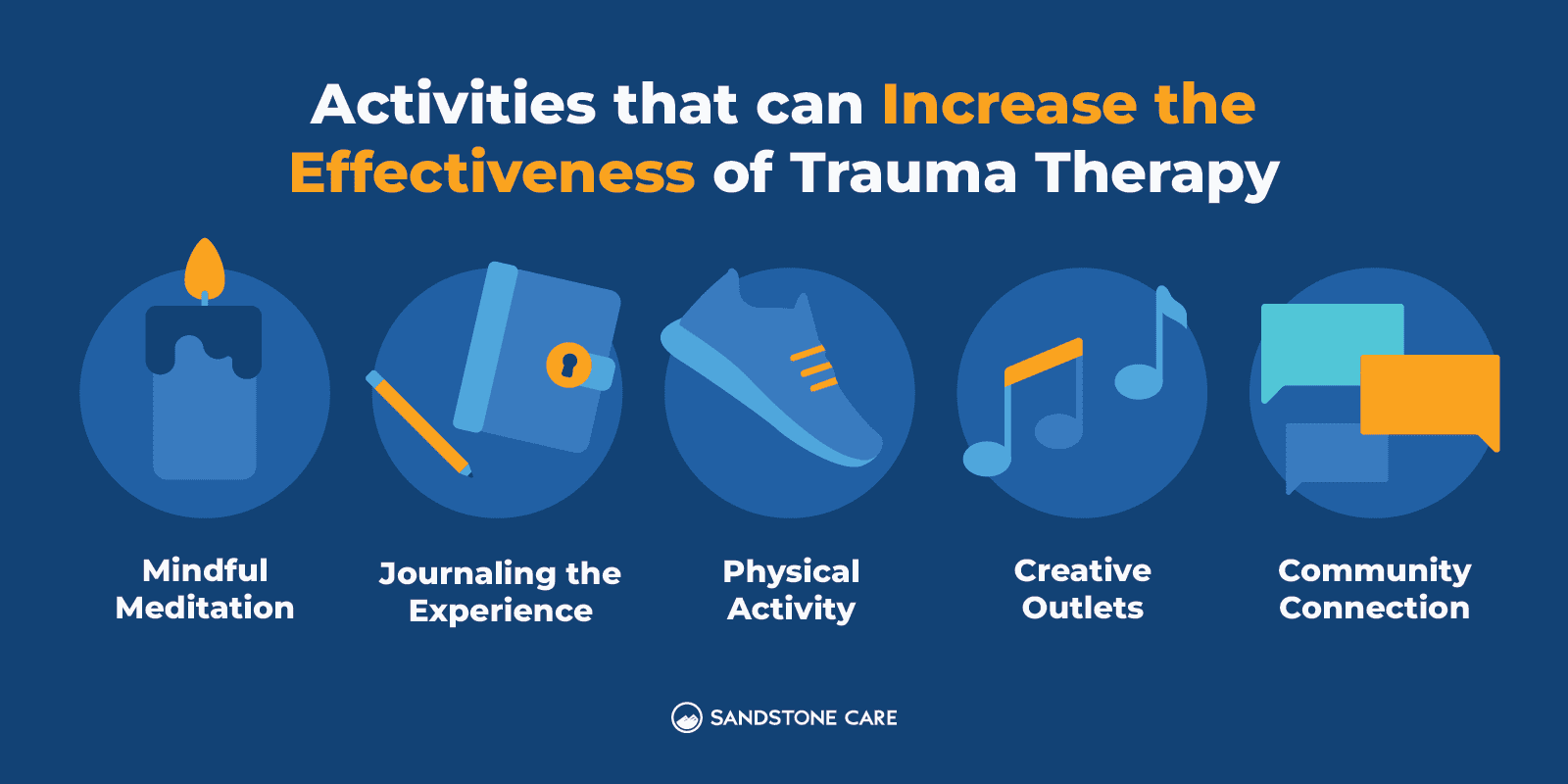
Types of Trauma Therapy
What Are the Different Types of Trauma Therapy?
Some of the most common types of trauma therapy include:
- EMDR Trauma Therapy
Utilizes bilateral stimulation of the brain to help individuals process traumatic memories. - Somatic Trauma Therapy
Sometimes known as somatic experiencing, this type of trauma therapy is a body-centered approach to treating PTSD that helps individuals release trauma from their bodies. - Trauma-Focused Cognitive Behavioral Therapy
Trauma-focused CBT can help children, adolescents, and families address the effects of early trauma. - Sexual Trauma Therapy
This form of therapy can help individuals who were sexually abused or exposed to sexually inappropriate behaviors. - Trauma Systems Therapy
Trauma systems therapy is geared towards children and adolescents who have seen or have been exposed to trauma. - Comprehensive Resource Model Therapy
Comprehensive Resource Model therapy (CRM) can help individuals with complex PTSD by connecting the primitive aspects of the person and the brain with the healthiest parts of the self. - Internal Family Systems Therapy (IFS)
Internal Family Systems Therapy is a form of psychotherapy built around the idea that every person has sub-personalities that may conflict with each other. - Cognitive Processing Therapy (CPT)
CPT is a form of cognitive behavioral therapy that can help reduce the symptoms of PTSD by helping a person evaluate and change upsetting thoughts related to their trauma. - Narrative Exposure Therapy (NET)
NET is a form of short-term psychotherapy that can help treat trauma disorders, specifically individuals experiencing complex and multiple traumas.
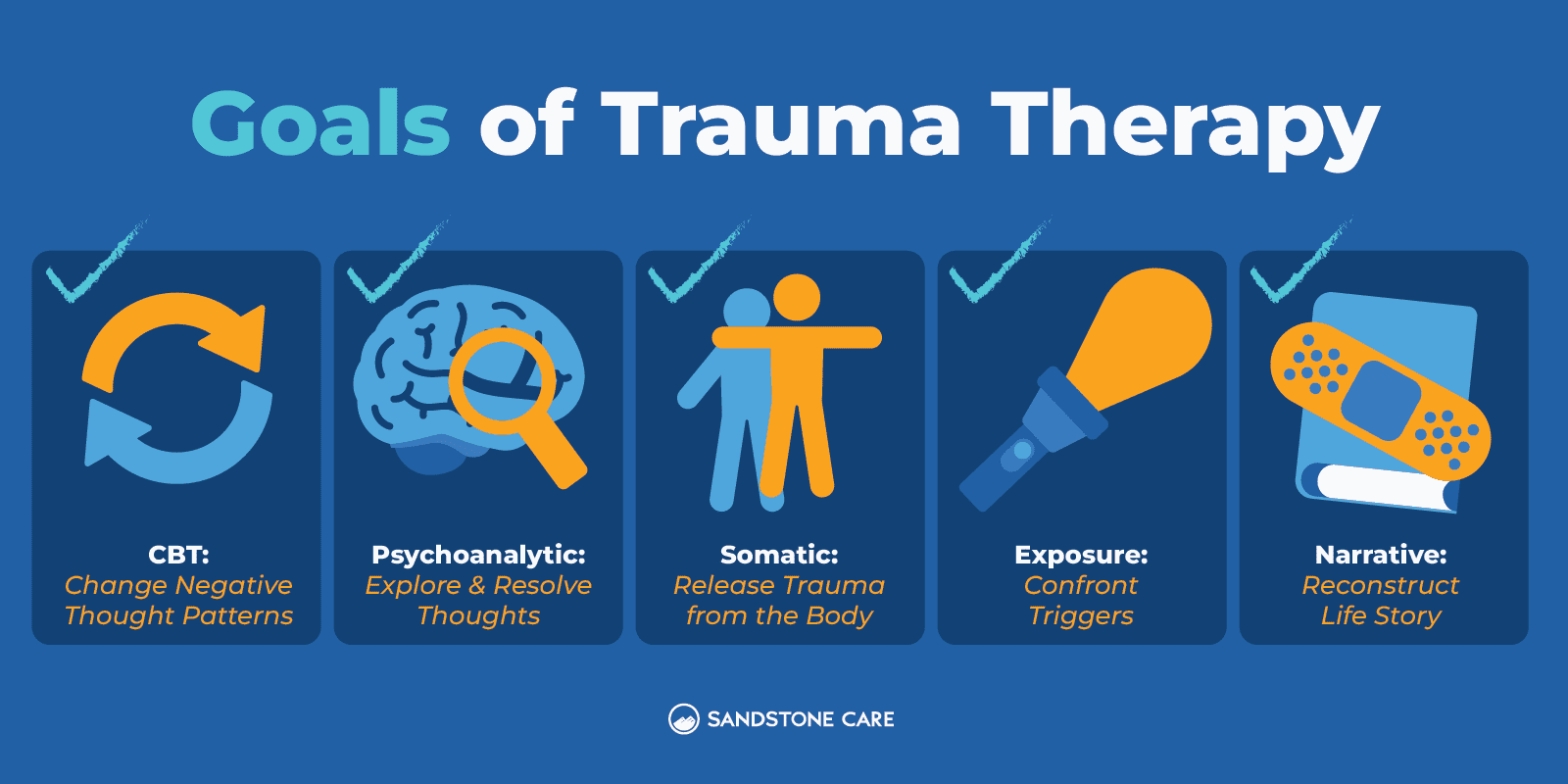
What Therapy Is Best for Trauma?
The best therapy for trauma is the one that fits the needs of the individual the best.
What Are the 3 Main Recommended Treatments for Trauma?
The most commonly recommended forms of therapy for trauma include prolonged exposure, cognitive processing therapy, and eye movement desensitization and reprocessing therapy.
Benefits of Trauma Therapy
What Are the Benefits of Trauma Treatment?
Some of the benefits of trauma therapy include:
- Identifying and managing triggers
- Building healthy coping skills
- Reducing feelings of anger, frustration, sadness, guilt
- Gaining a sense and understanding of traumatic events
- Overall improvement in health, well-being, and quality of life
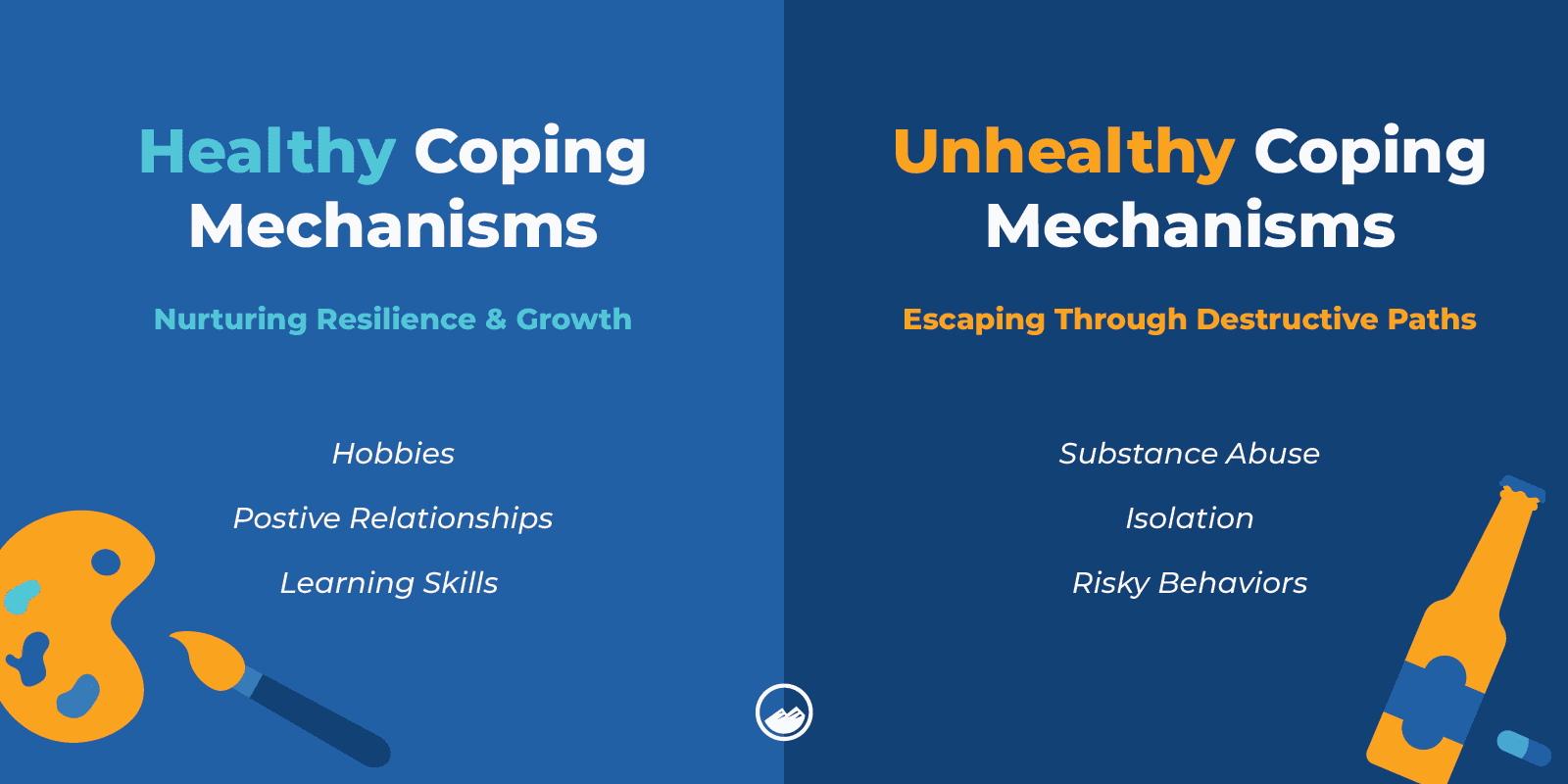
Why Is Trauma Counseling Important?
Trauma can affect every aspect of a person’s life and make it hard to get through everyday things like work, school, personal life, relationships, etc.
When a person has traumatic experiences, it can also take a toll on their physical, emotional, and mental health and well-being.
Trauma counseling can help a person better understand these traumatic events and process them to learn to manage their effects on their health and life.
What Are the Benefits of Trauma Therapy for Children?
A major benefit of trauma therapy for children is that it helps them feel more safe.
A traumatic event can impact a child’s sense of safety. Going through trauma therapy can help children rediscover this sense of safety while building trust, finding comfort, and becoming resilient.
Trauma therapy can help children heal and learn to cope with their feelings, experiences, and emotions before they become long-term issues, such as hyper-independence.
Does Trauma Therapy Make You Feel Worse?
In some cases, trauma therapy may make a person feel worse before they start feeling better.
This may be because trauma therapy can bring up past traumas or events that can be difficult to recall or talk about. Experiencing difficult feelings throughout the process is normal.
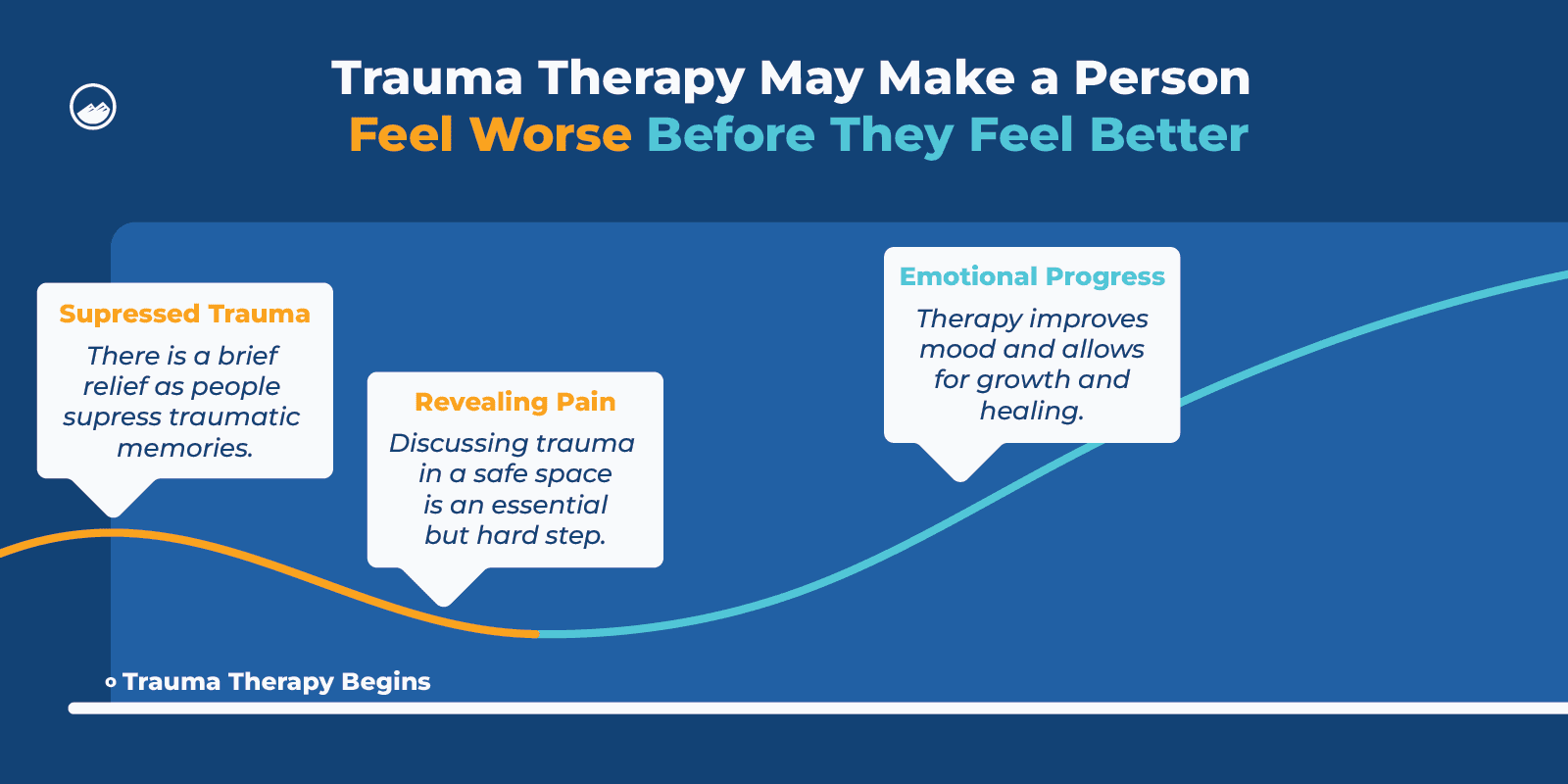
Trauma therapy is not easy and can be mentally exhausting.
This is one reason why it is so important to match with a mental health professional who you are compatible with and who is experienced in trauma-focused treatment.
However, if you feel that trauma therapy is doing more harm than good, it is important to talk with someone to discuss other options that you may have that better fit your needs.
Trauma Therapy Techniques
What Is an Example of a Trauma-Informed Practice?
One example of trauma-informed practice is realizing the impact and effects of trauma while understanding how to respond to these impacts and work on a path to recovery.
How Do You Demonstrate a Trauma-Informed Approach?
According to the Centers for Disease Control and Prevention (CDC), “the 6 guiding principles to a trauma-informed approach” include:
- Safety
- Trustworthiness
- Collaboration
- Empowerment & choice
- Peer support
- Cultural, historical, and gender issues
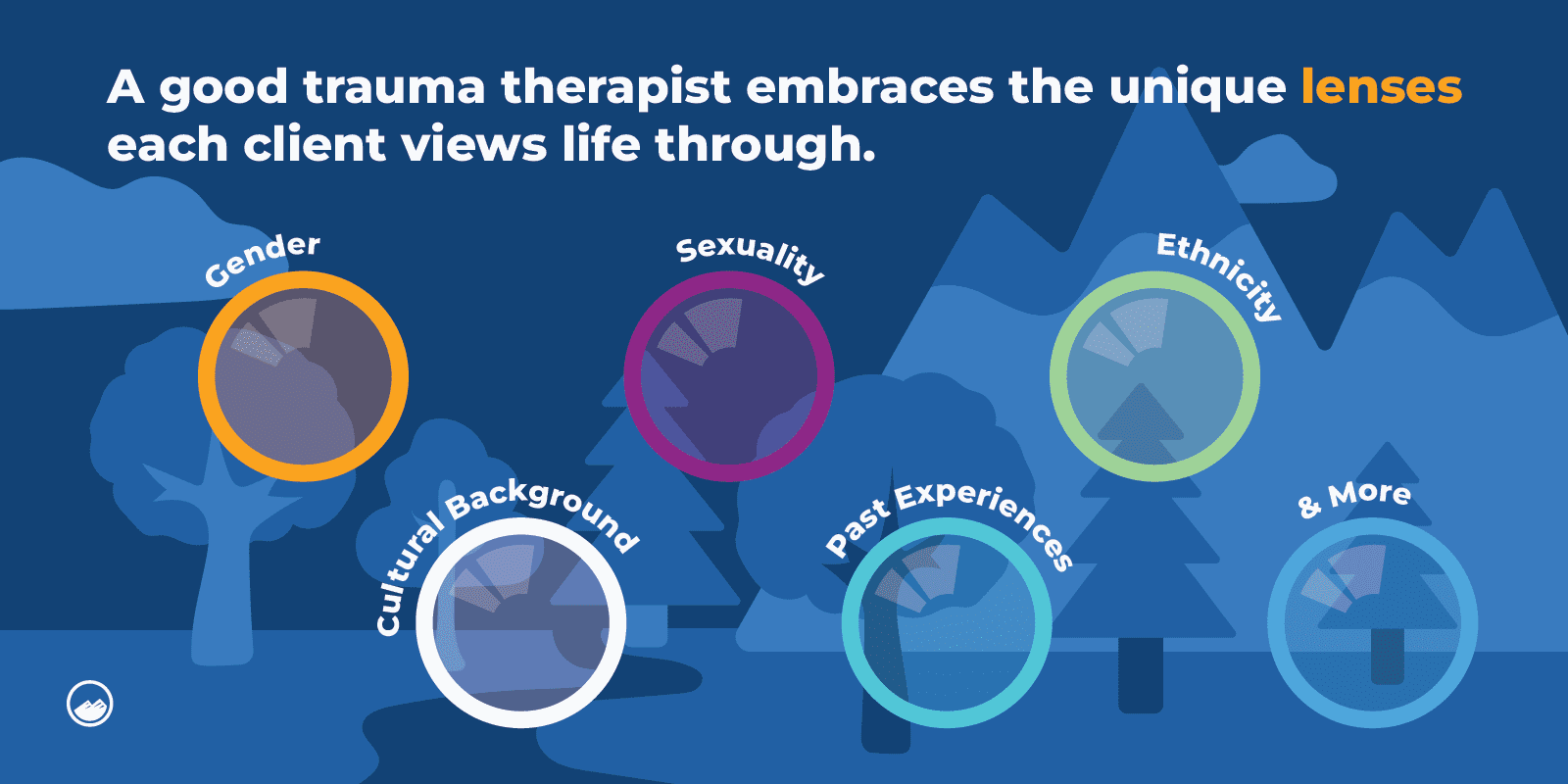
What Can Trauma Therapy Help With?
Trauma therapy can help a person learn about, understand, and process their trauma.
Through trauma therapy, a person can find a sense of safety that is often impacted after traumatic experiences, learn how to build healthy coping mechanisms, and also be able to identify triggers and learn how to manage them.
In doing this, trauma therapy can help a person find healing, relief, and an improvement in their physical and mental health and well-being.
How Does Trauma Therapy Work?
Different types of trauma therapy work in different ways.
In general, trauma therapy addresses traumatic experiences through collaboration between the individual and the therapist.
A trauma therapist can help individuals better understand and process their trauma while teaching them how to cope and release trauma.
How To Find a Trauma Therapist
Do I Need Trauma Therapy?
Some common signs a person may have unhealed trauma and can benefit from trauma therapy include:
- Difficulty trusting or opening up to people
- Hypervigilance
- Dissociation
- Low self-esteem and feelings of worthlessness
- Difficulty regulating emotions
- Experiencing negative thoughts about oneself or one’s life
- Experiencing flashbacks of traumatic experiences
- Physical symptoms like headaches, nausea, sweating, digestive problems, tightness in the chest, etc.
- Mental health conditions such as anxiety, depression, substance use disorder, or post-traumatic stress disorder
Many people with trauma may seem completely fine on the outside but may be going through challenges inside that no one knows about.
If you have trauma you haven’t talked to anyone about, contact someone you trust or directly to professional help.
If you or a loved one are experiencing suicidal thoughts, call the national suicide prevention lifeline at 988 or call 911.
How Do I Know if I Have Unhealed Trauma?
Unhealed trauma can manifest itself in many different ways.
Some people with unhealed trauma may isolate themselves both mentally and physically. They may also experience flashbacks or dissociation.
Unhealed trauma can also cause a person to be hyper-vigilant and have difficulty trusting others, which may mean that they don’t talk to anyone about what is truly happening.
Unhealed trauma may manifest physically, leading people to experience headaches, chest pain, or digestive problems.
When a person has unhealed trauma, the effects of their traumatic experiences can impact their everyday life. It can make it difficult to deal with conflict, to keep up with everyday responsibilities, and even to take care of yourself.
Sometimes trauma can cause you to block out memories, or in cases like roofie attacks and blackouts, you may not have a firm memory of what occurred. That’s why it is essential to reach out to mental health professionals for guidance on what you should do next.
When Should I Start Trauma Therapy?
Taking the step to start trauma therapy is a big one.
Knowing when to start trauma therapy means recognizing when you feel ready to talk. It is okay to be unsure, and just reaching out for professional help can provide you some guidance and support in figuring out what the best steps are to take for your specific needs.
Everyone’s timeline when it comes to trauma therapy is different. Some may start trauma therapy weeks after a traumatic experience, while others may not address their unhealed trauma years after their experiences occurred.
How Do You Talk About Trauma in Therapy?
Talking about trauma is not easy.
That is one of the reasons why it is so important to find a therapist that you feel comfortable with and who understands your needs.
Some things that can help when talking about trauma in therapy can include:
- Being open and honest
- Taking your time
- Establishing boundaries and consent
- Discuss your fears and feelings
- Use coping mechanisms that you learn throughout the way to help you process and talk about difficult experiences
- Practice compassion
- Take notes before or after therapy sessions
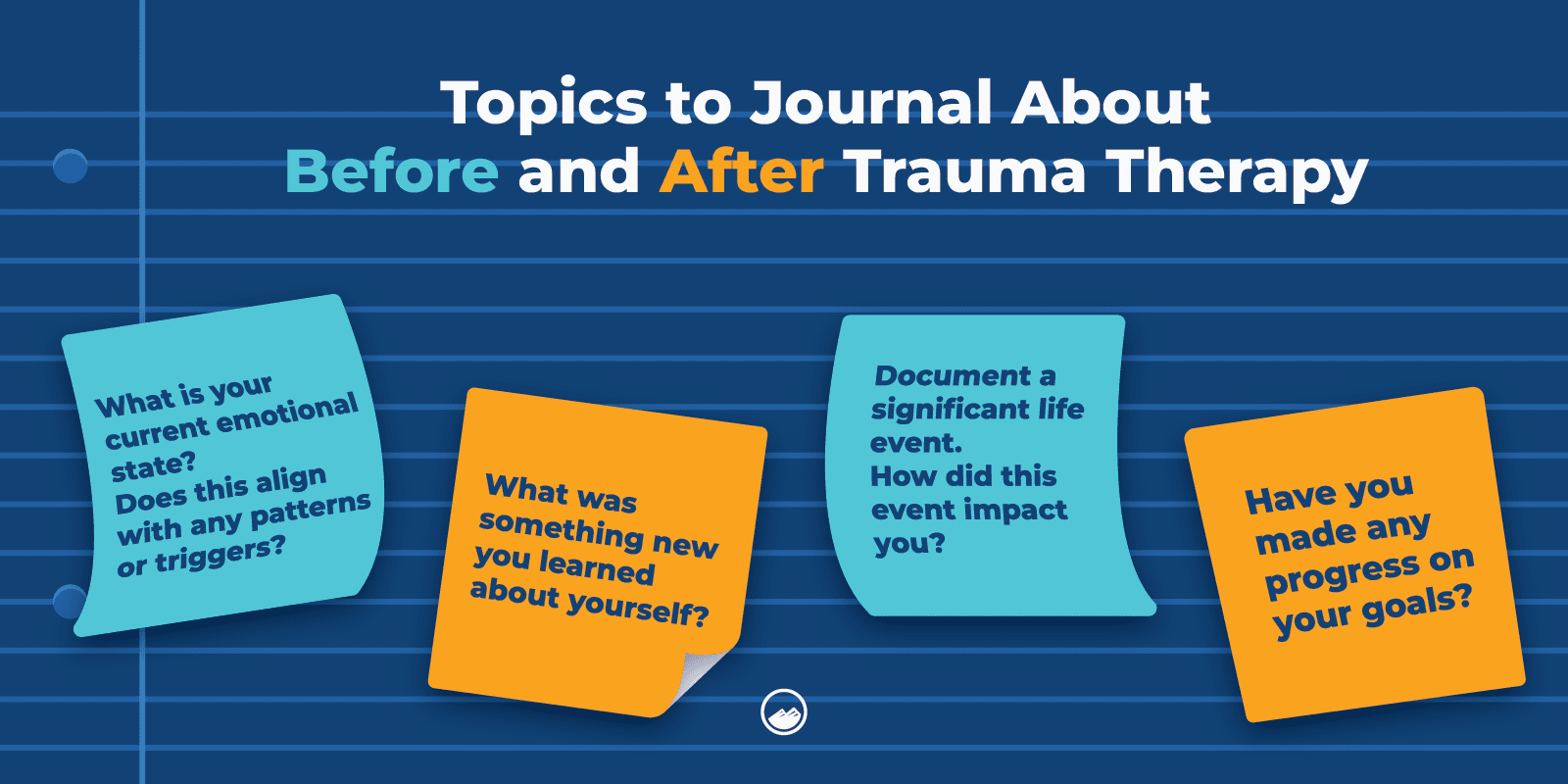
If you are nervous or unsure how to talk about trauma in therapy, know that your therapist is there to support you in sharing your trauma.
How Do I Get Trauma Therapy?
Getting trauma therapy starts with reaching out for help.
Adolescents may contact someone they trust first, like a caregiver, parent, teacher, counselor, or family member, to help them connect with professional help.
You can also start by reaching out to your healthcare provider, who can help guide you toward resources that fit your needs. Reaching out to a mental health professional can also help you learn more about the different types of treatment options you have.
Additionally, the Substance Abuse and Mental Health Services Administration (SAMHSA) has a treatment locator that serves as a confidential and anonymous resource for individuals looking for mental health or substance use treatment.
What Is the Difference Between a Therapist and a Trauma Therapist?
A trauma therapist differs from a traditional therapist in that they have more experience and training in trauma and use certain techniques and strategies that help individuals overcome their challenges and heal from the effects of trauma.
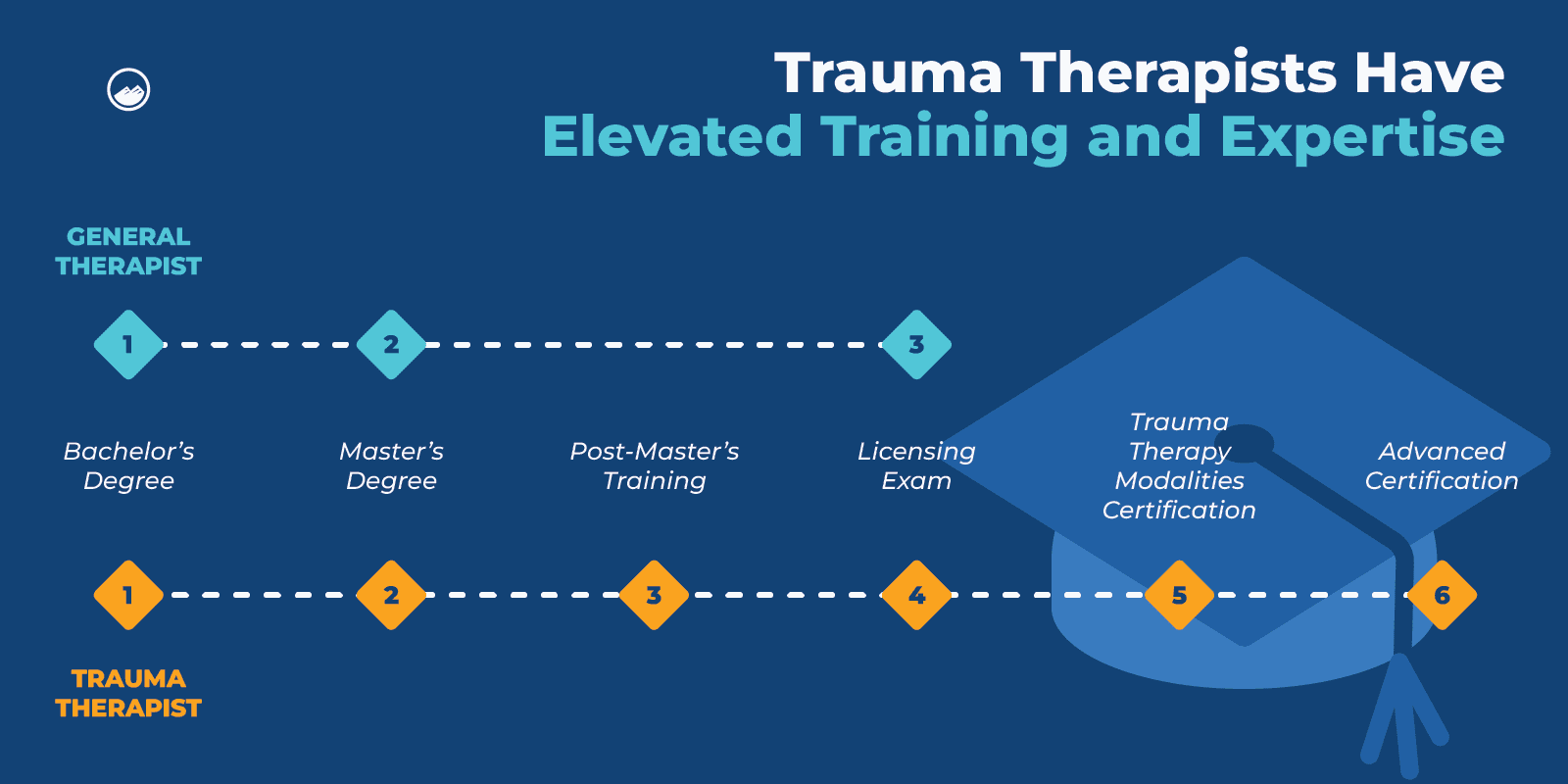
What Should I Consider When Finding a Good Trauma Therapist?
When starting trauma therapy, it is important to find a trauma therapist you feel comfortable with and who best fits your needs.
Some things to consider when looking for a good trauma therapist can include:
- Experience and understanding of your trauma
It can make a big difference when a therapist has special experience or training in similar situations to yours. For example, a therapist may have experience or training in therapy involving childhood trauma or domestic violence. - Different treatment approaches/modalities
A trauma therapist with different tools, such as experience in EMDR or EFT, may be able to offer you more choices and try different ways of healing from trauma. - Comfort and trustworthiness
It is important that you feel comfortable and safe with your therapist. You want to be confident that you can trust them and know that they are not there for judgment but to help you. This can also be seen in the boundaries between the therapist and the individual and the compassion and empathy they show.
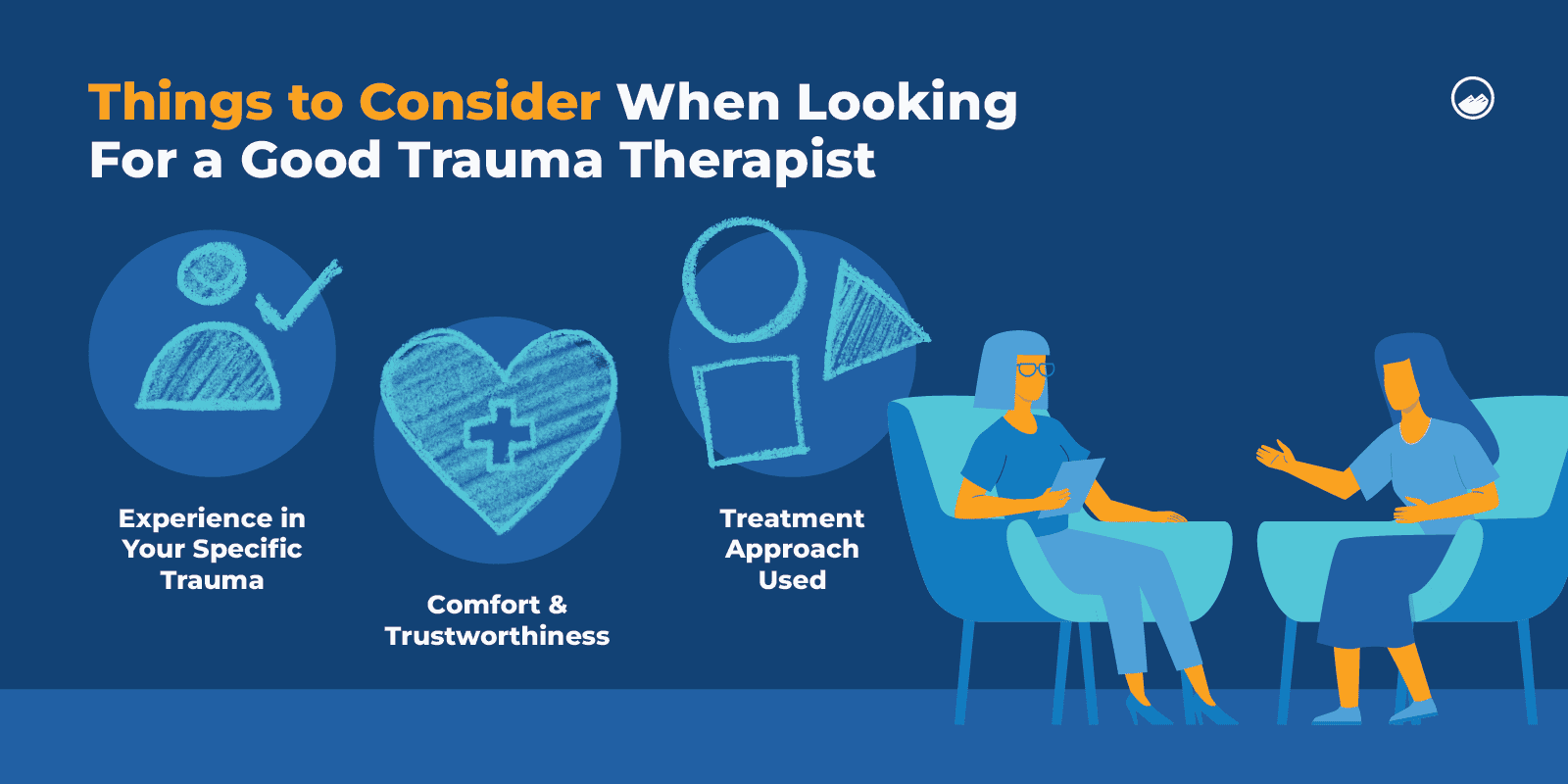
FAQ
You Have Questions, We Have Answers.
Our goal is to provide the most helpful information. Please reach out to us if you have any additional questions. We are here to help in any way we can.
Psychotherapy, also known as talk therapy, is a term that is used to refer to a wide range of methods and approaches that involve talking with a psychologist, psychiatrist, or another mental health professional.
Trauma therapy can be a form of psychotherapy with a specific focus on trauma.
One of the differences between psychotherapy and trauma therapy is that psychotherapy typically focuses on cognitive processes. In contrast, trauma therapy focuses more on the thoughts and feelings surrounding a person’s experiences.
Some people may want to try to heal from trauma with time without going to therapy.
The American Psychological Association lists different tips from psychologists and other researchers that may help a person cope with trauma and find healing.
One is by finding support from your loved ones. Talking to friends, family members, or anyone you trust can help you feel safe and comfortable talking about your feelings and experiences and asking for help.
Another part of healing is prioritizing self-care. Try to eat balanced meals, get physical activity, and get good rest. Self-care also means doing things that you enjoy or that help you feel relaxed, such as a hobby, art, writing, music, or spending time outside.
When a person goes through a traumatic experience, it is normal to want to avoid people, places, or reminders of the traumatic event. It is important to be patient with your healing journey and take the time you need, but over time, it is also important to find a routine that works for you and to face your feelings.
If a person experiences trauma, it can impact many aspects of their life.
When a person doesn’t address how the trauma has affected them and develops unhealthy coping mechanisms, it can lead to mental health conditions that take a toll on a person’s mental health and well-being.
Trauma therapy may not be necessary for all, but in many cases, it is essential in finding healing.
Trauma therapy is very difficult and complex because it can be hard to talk or even think about traumatic experiences.
Trauma can impact a person’s sense of safety and trust, so opening up to someone can take a lot, even if it is a therapist.
It can also be hard to accept things that may have happened and to move forward from them. Trauma therapy brings up all these things and requires a lot of patience and effort.
Trauma therapy for adults aims to help individuals heal emotionally and mentally from the effects of trauma.
Trauma therapy should focus on the unique needs of each adult to help them to be able to function healthily in their job and family responsibilities.


Let’s Take the Next Steps Together
Trauma can impact every aspect of a person’s life, physically, mentally, and emotionally. Trauma therapy can help children, adolescents, and adults heal from the effects of trauma. Sandstone Care is here to support teens and young adults with mental health and substance use disorders.


